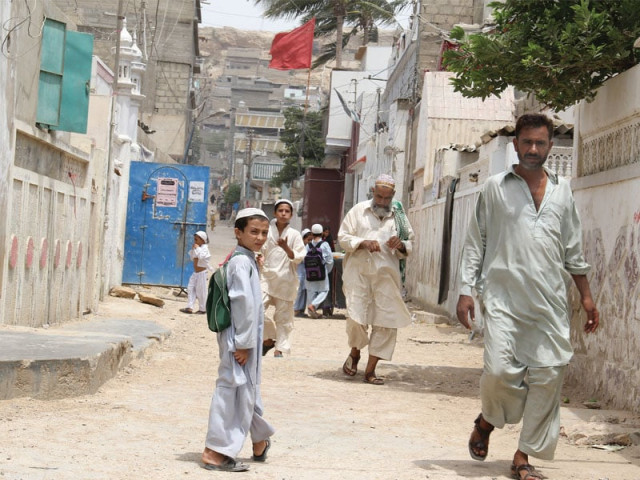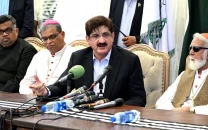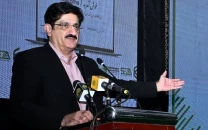UN reports that 30 govt schools in Qasba shut down since 2011
Children turn to madrassas for more than an education.

Since June 2011, when ethnic violence erupted in Qasba Colony, people of the area - especially children - have been left struggling to live a normal life.
The road leading to Qasba paints a bleak picture with a drug den where teenagers flock to buy heroine or hashish, a school wall pockmarked with bullet holes and three schools in ruins, with one of them being used as a dump.
According to the article publcished on United Nation’s Integrated Regional Information Network (IRIN) website on October 24, around 400 teachers have stopped coming to the area. Earlier, Urdu-speaking teachers could travel to Pakhtun localities and vice versa, but the turf war between the Muttahida Qaumi Movement and the Awami National Party has limited their access. IRIN reports that 30 government schools in Qasba have shut down, leaving the fate of 25,000 students hanging in the balance.
“Youngsters, who were once students, now roam the streets and wait for riots to start as that is when they can easily steal and create ruckus,” said Sajid Hussain, a school teacher from the area.
According to police, at least 10 crimes are recorded every week in Qasba Colony.
Private education or madrassas
With the closure of government schools, people are left with only two choices - private schools or madrassas. As the former are usually costly, the latter have reportedly become popular.
Apart from the minimal fees, madrassas also provide shelter and two meals a day which is a selling point.
“Madrassas are an all-in-one package. It offers food, shelter and education,” said Abdul Waheed Khattak, a civil society activist who lives in the area and has been campaigning for madrassa reforms since 1996.
Khattak wants to volunteer at madrassas to enter into dialogue with teachers and try to get them to run courses specified by the government. He also encourages hiring female teachers and enrolling girls but says most schools are dominated by hardliners who endorse only the Dars-e- Nizami which was set in the 18th century.
“Around 15,000 students attend madrassas in Qasba Colony, but except for one or two, the schools are all unregistered,” said Ali, a teacher who supports the reforms. Unregistered madrassas risk closure and do not receive government funding.
Famous or infamous
Students and teachers from abroad are barred from entering a registered madrassa without a No Objection Certificate from the Interior Ministry. “This was done to limit foreign control in madrassas which may lead to breeding terrorism,” said Shakeel Auj, dean of the faculty of Islamic Studies at Karachi University, referring to the theory that some madrassas are funded by countries to promote more radical interpretations of Islam.
Police say that banned groups, such as the Tehreek-e-Taliban Pakistan, have been infiltrating unregistered madrassas in Qasba.
In the 2011 Education Emergency Report, however, the Pakistan Education Taskforce said that the increased influence of madrassas in the education system was a myth. According to them, only six per cent Pakistani students attend religious schools.
“But six per cent of madrassa students amounts to thousands of youngsters who live in these regimented institutions 24 hours a day and grow up to lead a certain lifestyle,” points out Jaffar Ahmed, chairperson of the Pakistan Study Centre at Karachi University.
According to a report by the government and the US Agency for International Development, 1.7 million people were enrolled in madrassas in Pakistan in 2011.
Education from a madrassa might not get most students jobs in multi national corporations but that is not a problem for most. “We are taught to serve Islam,” says a graduate from Jamai Binoria, a degree-awarding institution in Karachi. “Serving Islam means either building a mosque or a madrassa, or becoming a teacher in a madrassa.”
Published in The Express Tribune, October 26th, 2012.



















COMMENTS
Comments are moderated and generally will be posted if they are on-topic and not abusive.
For more information, please see our Comments FAQ